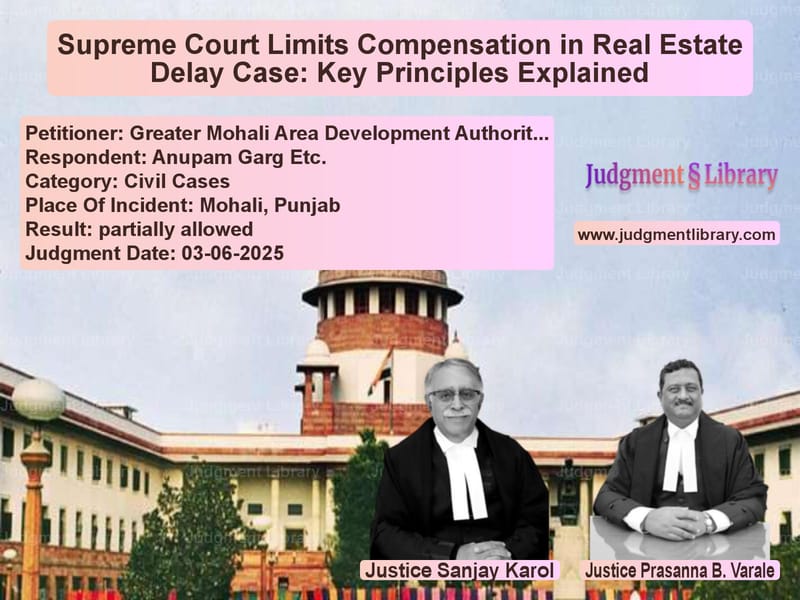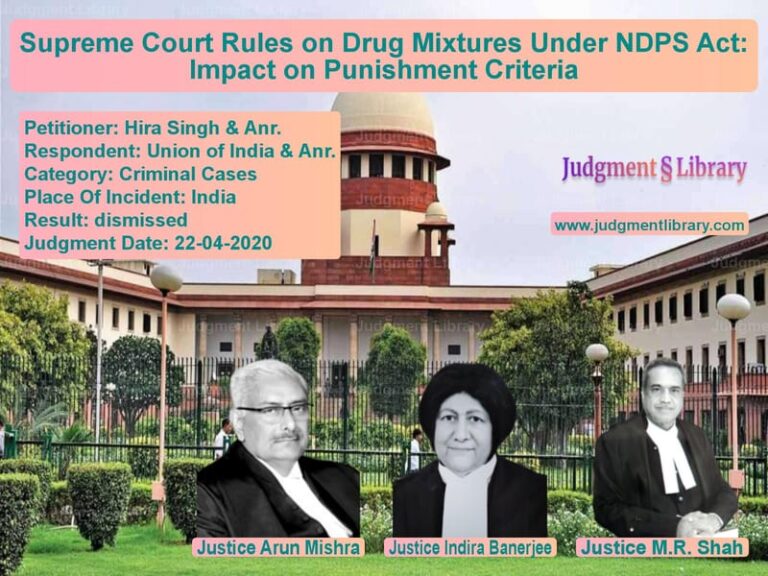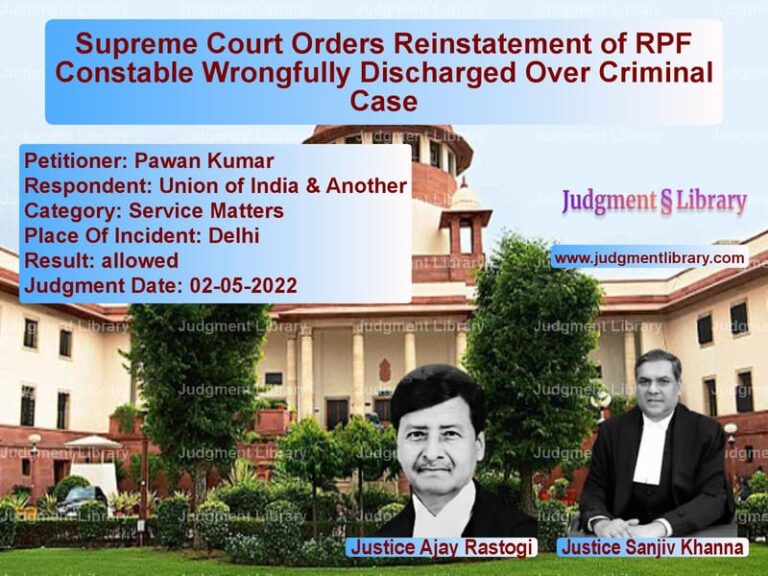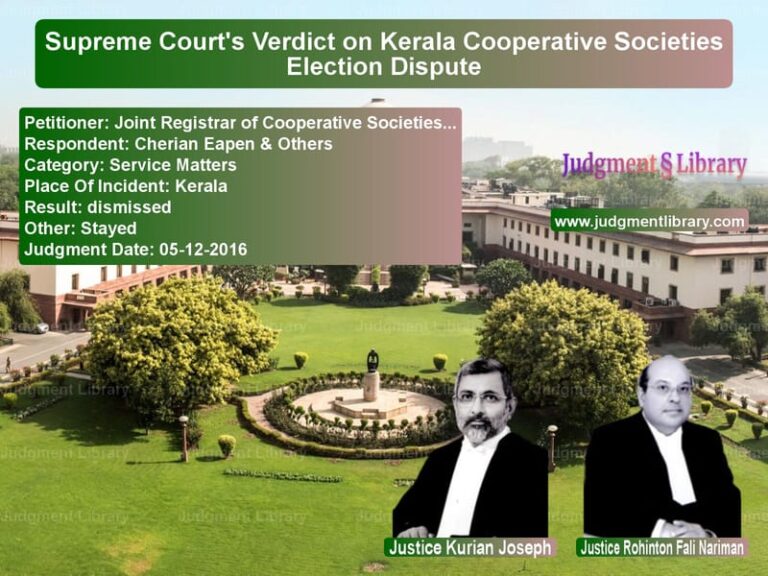Supreme Court Limits Compensation in Real Estate Delay Case: Key Principles Explained
In a significant judgment clarifying the scope of compensation in real estate delay cases, the Supreme Court of India has partially allowed an appeal by Greater Mohali Area Development Authority (GMADA) against homebuyers, setting important precedents on the limits of compensation that can be awarded by consumer courts. The judgment, delivered by a bench comprising Justice Sanjay Karol and Justice Prasanna B. Varale, provides crucial guidance on how compensation should be calculated when developers fail to deliver projects on time and the relationship between contractual terms and statutory compensation.
The Background of the Case
The legal dispute began when GMADA launched a residential scheme called ‘Purab Premium Apartments’ in Sector 88, Mohali, in 2011. Anupam Garg and Rajiv Kumar, the respondents in this case, applied for 2-BHK apartments with servant rooms, paying 10% of the total consideration of ₹55 lakhs as earnest money. Both were successful in the draw of lots held on March 19, 2012, and were issued Letters of Intent on May 21, 2012.
The LOI contained crucial terms regarding payment schedule and possession. It specifically stated that possession would be handed over after completion of development works within 36 months from the date of issuance of the Letter of Intent – making the scheduled delivery date May 21, 2015. Most importantly, the LOI contained a critical clause: “In case for any reason, the Authority is unable to deliver the possession of apartments within stipulated period, allottee shall have the right to withdraw from the scheme by moving an application to the Estate Officer, in which case, the Authority shall refund the entire amount deposited by the applicant along with 8 % interest compounded annually. Apart from this, there shall be no other liability of the Authority.”
When the respondents visited the development site in May 2015, they found minimal development and concluded that possession wouldn’t be delivered for another 2-3 years. They decided to opt out of the scheme and sought refunds as per the LOI terms.
The Legal Journey Through Consumer Forums
The homebuyers filed consumer complaints before the State Consumer Disputes Redressal Commission, Punjab, which partly allowed their complaints. The State Commission directed GMADA to refund the entire deposited amount along with 8% interest as per the LOI, plus additional compensation including ₹60,000 for mental harassment, ₹30,000 as litigation costs, and crucially – the entire interest paid by the respondents to their banks for loans taken to finance the apartment purchases.
GMADA appealed to the National Consumer Disputes Redressal Commission (NCDRC), which dismissed the appeals both on grounds of delay and merit, while also imposing costs of ₹20,000 each to be paid to both respondents. The NCDRC relied on its earlier decision in Greater Mohali Area Development Authority v. Priyanka Naiyyar, where it had granted compensation of ₹2 lakhs in addition to 8% interest, considering that the complainant had suffered interest on loans taken at 10.75%.
Aggrieved by the order making it liable for bank loan interest payments, GMADA approached the Supreme Court, which limited its examination to whether the consumer forums could award interest on loans taken by homebuyers in addition to the contractual 8% interest.
Arguments Before the Supreme Court
The appellants, GMADA, argued that “casting liability for the respondents’ loan upon GMADA is not a position under law.” They maintained that the contractual terms clearly limited their liability to refund of the deposited amount with 8% interest compounded annually, and this should be the extent of their responsibility.
The respondents, however, argued that “the terms of the agreement cannot circumscribe the authority of the Commission to award just compensation.” They contended that consumer forums have the requisite authority to grant compensation over and above what is agreed in the contract, especially when the developer has been deficient in providing services.
The Supreme Court’s Legal Analysis
The Supreme Court began its analysis by examining established principles regarding grant of relief to allottees aggrieved by delay in delivery of flats. The Court referred to Bangalore Development Authority v. Syndicate Bank, which laid down that “Where the development authority having received the full price, does not deliver possession of the allotted plot/flat/house within the time stipulated or within a reasonable time… the allottee is entitled for refund of the amount paid, with reasonable interest thereon from the date of payment to date of refund. In addition, the allottee may also be entitled to compensation, as may be decided with reference to the facts of each case.”
The Court also examined GDA v. Balbir Singh, which emphasized that “compensation cannot be uniform” and must be determined based on the specific facts and circumstances of each case. The judgment noted that “the Forum or the Commission must determine that there has been deficiency in service and/or misfeasance in public office which has resulted in loss or injury.”
However, the Court made a crucial distinction in the present case. It found that the State Commission and NCDRC’s reliance on Priyanka Naiyyar was misplaced. The Court clarified: “In that case, ₹ 2 lakhs was given as compensation, taking into account that the complainant had suffered interest in the loan taken at the rate of 10.75%. It was not given as payment for the interest itself.”
Key Legal Principles Established
The Supreme Court laid down several important principles that will guide future real estate compensation cases. Quoting from DLF Homes Panchkula (P) Ltd. v. D.S. Dhanda, the Court emphasized: “The forums under the Act cannot award interest and/or compensation by applying rule of thumb. The order to grant interest at the maximum of rate of interest charged by nationalised bank for advancing home loan is arbitrary and has no nexus with the default committed.”
The Court made a significant observation about the relationship between developers and homebuyers: “That apart, whether the buyers of the flat do so by utilizing their savings, taking a loan for such purpose or securing the required finances by any other permissible means, is not a consideration that the developer of the project is required to keep in mind. For, so far as they are concerned, such a consideration is irrelevant. The one who is buying a flat is a consumer, and the one who is building it is a service provider. That is the only relationship between the parties.”
The Court explained the fundamental purpose of interest awards: “What flows from the above is that the amount of interest awarded is the compensation to the investment maker for the amount of money and the time he has been denied the fruits of that investment. The 8% interest awarded in this case on top of the entire amount that is being invested, is the compensation for being deprived of the investment of that money. Apart from this no amount of interest on the loan taken by the respondents could have been awarded.”
Court’s Final Ruling and Clarifications
The Supreme Court allowed GMADA’s appeal specifically regarding the bank loan interest component while upholding other compensation elements. The Court clarified: “We clarify that we have in no way held that the Commission is not empowered to give compensation, generally. For that reason, we do not interfere with the award of certain amounts on account of mental agony and litigation costs. We have only interfered with that part of the order as set out in the notice.”
The Court directed that the amount already deposited by GMADA before the State Commission (which did not include the bank loan interest component) be disbursed to the respondents, with no requirement for further deposits.
Impact and Significance of the Judgment
This judgment establishes crucial boundaries for compensation in real estate delay cases. While it reaffirms the rights of homebuyers to seek compensation for deficiency in service, it also sets reasonable limits on what developers can be made liable for. The Court’s reasoning that the method of financing chosen by homebuyers is irrelevant to the developer’s liability provides important clarity for the real estate industry.
The decision balances consumer protection with contractual certainty, recognizing that while consumer forums have the power to award compensation beyond contractual terms, this power must be exercised judiciously and not as a rule of thumb. The judgment emphasizes that compensation must have a direct nexus with the default committed and cannot include elements that are too remote or unrelated to the developer’s actions.
This precedent will likely influence future consumer cases involving real estate delays, ensuring that compensation remains fair, reasonable, and proportionate to the actual deficiency in service, while preventing excessive liabilities that could destabilize the real estate sector. The judgment maintains consumer protection while bringing much-needed certainty to developer liability in delay cases.
Petitioner Name: Greater Mohali Area Development Authority (GMADA) Through Its Estate Officer (H).Respondent Name: Anupam Garg Etc..Judgment By: Justice Sanjay Karol, Justice Prasanna B. Varale.Place Of Incident: Mohali, Punjab.Judgment Date: 03-06-2025.Result: partially allowed.
Don’t miss out on the full details! Download the complete judgment in PDF format below and gain valuable insights instantly!
Download Judgment: greater-mohali-area-vs-anupam-garg-etc.-supreme-court-of-india-judgment-dated-03-06-2025.pdf
Directly Download Judgment: Directly download this Judgment
See all petitions in Consumer Rights
See all petitions in Judgment by Sanjay Karol
See all petitions in Judgment by Prasanna Bhalachandra Varale
See all petitions in partially allowed
See all petitions in supreme court of India judgments June 2025
See all petitions in 2025 judgments
See all posts in Civil Cases Category
See all allowed petitions in Civil Cases Category
See all Dismissed petitions in Civil Cases Category
See all partially allowed petitions in Civil Cases Category







